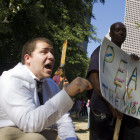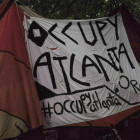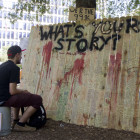
Occupy Atlanta Protestors Clash with Police, 20 Arrested
|
Woodruff Park in downtown Atlanta was once again the scene of protests and arrests Saturday night as Occupy Atlanta demonstrators clashed with police. Nineteen protestors were arrested, many for refusing to stay on sidewalks and blocking city streets, after demonstrators began an impromptu march down Peachtree Street. Occupy Atlanta demonstrators vowed to once again camp out in Woodruff Park despite a warning from Atlanta Mayor Kasim Reed that anyone remaining in the park after it closed at 11 p.m. would be arrested. However, protestors began exiting the park shortly after the deadline as dozens of police officers on motorcycles and horses—some in riot gear, according to The Atlanta Journal-Constitution—encircled the park preparing to make arrests. A handful of protestors remained in the park and were arrested, a symbolic move by the protestors one Occupy Atlanta spokesperson told Atlanta’s WSB-TV.

